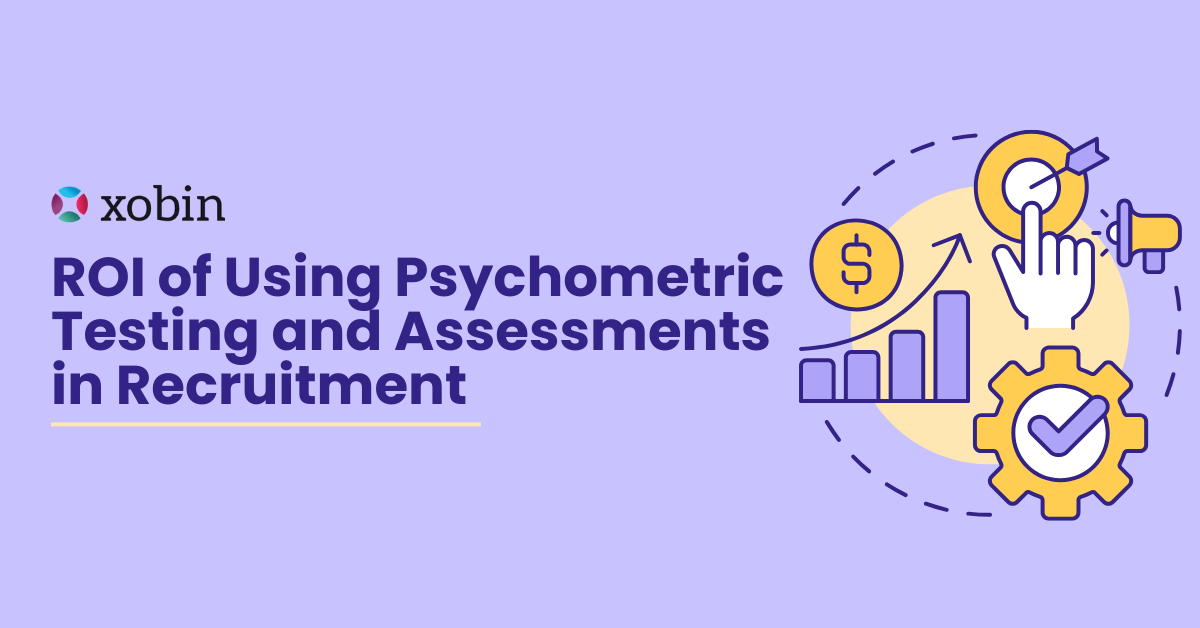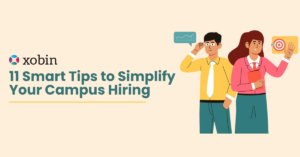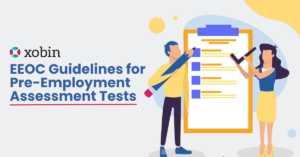As a recruiter, campus hiring drives can be an overwhelming task. Sifting through thousands of resumes, conducting interviews, and trying to identify the best fit for your organization in a short amount of time requires immense effort. However, with the right strategies and tools, you can streamline this process and make campus recruitment efficient, less time-consuming, and even more effective. In this blog, we’ll explore how you can simplify your campus hiring and find the best talent for your organization using smart tips and campus recruitment solutions that ensure a smooth recruitment journey. If you’re seeking innovative ways to enhance your campus hiring process, read on!
Why is Campus Hiring So Important?
Before diving into the tips, let’s understand why campus hiring is such a crucial part of the recruitment strategy for many companies. Campus hiring provides access to a pool of fresh, enthusiastic candidates eager to learn and grow with your organization. These candidates often bring new ideas, diverse perspectives, and energy that can drive innovation in your company.
Moreover, hiring from campuses allows you to mold these fresh talents according to your company culture, ensuring they fit seamlessly in the long run. Campus hires can be molded to become loyal employees, saving your organization time and effort in retraining.
Best Tips to Optimize Your Campus Hiring
1. Understand the Need of a Streamlined Campus Hiring
In today’s competitive job market, campus recruitment is crucial in sourcing fresh talent. It’s a key channel for companies to identify the next generation of skilled professionals. However, as much as it can be a great opportunity, it can also be a complex process. Here’s why streamlining is essential:
- Increased efficiency: With an effective campus hiring strategy, you can quickly save valuable time by filtering the right candidates.
- Enhanced candidate experience: A smooth process ensures candidates have a positive experience, making your company more attractive.
- Reduced hiring time: You can quickly identify the best talent by eliminating unnecessary steps, shortening the hiring time.
- Improved quality of hire: Using the right tools and strategies enables you to select the most qualified candidates who will succeed in your organization.
2. Leverage Technology for Efficient Campus Hiring
One of the most significant advancements in campus recruitment is using technology to streamline various stages of the hiring process. By automating your campus hiring drive, you can reduce manual efforts and focus on evaluating the right candidates.
Automate Candidate Screening with Pre-Employment Assessments
Online assessment tools like pre-hire assessments allow you to screen and shortlist candidates based on their skills automatically. Whether coding tests, psychometric tests, or domain-specific questions, campus recruitment software can evaluate candidates before the interview stage.
Streamlined Interview Scheduling
Gone are the days of juggling calendars and sending back-and-forth emails to schedule interviews. Conduct structured interviews using AI-driven video interview tool to assess soft skills. This can automate interview scheduling by syncing with candidate calendars, making it easier to manage and coordinate interviews for large groups of students during campus recruitment drives.
Data Analytics for Better Decision-Making
Using campus hiring tools with data analytics features allows you to analyze candidate performance, helping you make data-driven hiring decisions. This eliminates biases and ensures a more objective approach to hiring, which is especially crucial when selecting from a pool of fresh graduates.
3. Develop a Structured Campus Hiring Plan
When it comes to campus hiring, having a structured plan is key. Many recruiters dive straight into the process without a clear strategy, leading to confusion and missed opportunities. A well-structured hiring plan allows you to manage time better and ensures a smooth hiring process.
Here’s how you can create an effective campus hiring plan:
- Set Clear Goals: What do you want to achieve from campus hiring? Is it to fill specific roles, find interns, or build a pipeline for future positions? Setting clear goals will guide your process.
- Plan Campus Visits or Virtual Engagements: Decide whether you want to visit campuses or go the virtual route. Campus hiring events can be physical, virtual, or hybrid. With virtual events, you can reach a broader audience and streamline your recruitment process, especially when using advanced online assessment tools to assess candidates.
- Identify Key Universities or Colleges: Narrow down which campuses align best with your company’s needs. Depending on your hiring requirements, focus on institutions that specialize in relevant fields, like engineering, business, or IT.
- Build Relationships: Campus hiring isn’t just about filling roles but building long-term relationships with universities. Connect with career centers, student clubs, and faculty members to establish a consistent presence on campus.
4. Simplify Candidate Assessment with Customizable Skill Tests
Pre-employment testing is an excellent way to simplify your campus hiring process. Rather than relying solely on resumes or interviews, skills-based assessment tests allow you to objectively evaluate a candidate’s skills, intelligence, and potential for growth. They also help you identify who is truly qualified for the position.
Skill-based Testing
With tools like skills assessment software, recruiters can customize and create skills assessments to evaluate candidates based on the job’s specific requirements, whether you need to assess technical skills, soft skills, or cognitive abilities. These tools help you test candidates effectively before moving to the next stage. Moreover, skills testing filters out unqualified applicants early on, reducing the need for time-consuming interviews with unsuitable candidates.
Real-Time Feedback and Instant Results
Instead of waiting days for feedback, candidates can receive instant results after completing the tests. This speeds up the hiring process, making it more efficient and saving time for both recruiters and candidates.
5. Enhance Collaboration Between HR and Hiring Managers
Collaboration between HR teams and hiring managers is vital for an efficient campus hiring process. When teams work together seamlessly, there is a better alignment regarding candidate selection, which helps reduce confusion and streamline decision-making.
Centralized Communication
A campus hiring software solution allows for centralized communication between HR and hiring managers. All information regarding candidates, including test results, interview notes, and feedback, can be accessed in one place, making it easier to collaborate and decide which candidate to hire.
Team Collaboration on Candidate Evaluation
Instead of relying on individual assessments, all team members can provide input during the evaluation process, leading to a more balanced and fair decision. This also helps improve the quality of your hires, as everyone involved in the process can contribute their unique perspective.
6. Target the Right Campuses and Build Relationships
Choosing the right campuses to recruit from is key to simplifying your campus hiring process. Establishing relationships with universities and colleges will likely make your campus recruiting efforts more efficient.
Build a Strong University Network
Establishing strong relationships with key campuses can simplify your campus recruitment process. This ensures you’re targeting the right talent pool and receiving applications from students who fit your hiring requirements.
Branding on Campus
Invest in creating a strong employer brand on campuses. Hosting webinars and virtual information sessions and providing scholarships or internships can position your organization as an attractive workplace. The stronger your brand, the more students seek to apply, reducing the effort required to source candidates.
7. Optimize the Candidate’s Experience
Candidate experience is more important than ever. A smooth and efficient campus recruitment process will enhance your employer brand and attract top talent. Here are a few tips to improve the candidate experience:
Clear and Transparent Communication
Ensure that candidates are well-informed throughout the hiring process. Keeping them updated on timelines, expectations, and next steps will help them feel more engaged and show that your company values their time and effort.
Simplified Application Process
A lengthy or complicated application process can deter potential candidates from applying. An Applicant Tracking System can simplify the process and make it easier for students to apply.
Engage with Interactive Content
Provide candidates with engaging content, such as videos or webinars, that highlights your company culture and values. This will give them a better understanding of what working with your organization looks like.
Respect Their Time
Fresh graduates often have busy schedules. Scheduling interviews efficiently and ensuring the process is as short and transparent as possible will respect their time and improve the overall experience.
8. Emphasize Campus Ambassadorship Programs
Campus ambassadors can be your best resource for spreading the word about your company. A campus ambassador program allows students to represent your company, becoming a brand ambassador for your hiring efforts. They can raise awareness about job opportunities, recruitment events, and the benefits of working with your organization.
Moreover, campus ambassadors can also help pre-screen candidates by sharing insights into the skills and attributes that are most valuable for your company. With ambassadors on the ground, you can extend your recruitment efforts beyond formal campus visits, creating a more organic talent pipeline.
9. Use Gamification to Attract Top Talent
Gamification in campus hiring is a great way to make the process engaging and attract top-tier talent. Gamified assessments allow candidates to showcase their abilities in a fun and interactive way while enabling recruiters to evaluate problem-solving, critical thinking, and creativity.
Interactive Assessments
Xobin offers gamified assessments that can be customized to align with your company’s needs. These evaluations help keep candidates engaged while providing valuable insights into their capabilities.
Encourage Friendly Competition
A competitive yet supportive atmosphere can attract top candidates who thrive in dynamic environments. Gamified tests also help candidates demonstrate their skills in real-time, making assessing their performance under pressure easier.
10. Prioritize Diversity and Inclusion in Your Hiring Process
As companies become more aware of diversity and inclusion, it’s crucial to factor these values into your campus hiring efforts. Diverse teams are proven to foster innovation, and recruiting from a broad talent pool ensures you have various perspectives and ideas.
Unbiased Evaluation
AI-based assessment tools can help eliminate unconscious bias during the screening and interview stages. These tools ensure that you select candidates based on their skills and abilities rather than personal attributes.
Provide Equal Opportunity
Ensure that every student, regardless of background, has equal access to opportunities within your recruitment process. Promote diversity and inclusion by offering support to candidates from underrepresented groups.
Collaborate with Diverse Campus Organizations
Partner with student groups that focus on promoting diversity and inclusion on campus. This ensures you’re reaching candidates from all backgrounds.
11. Monitor and Improve Your Campus Hiring Strategy
The campus hiring process doesn’t end after you’ve hired the best candidates. It’s crucial to continuously monitor and improve your strategy to ensure you are attracting top talent year after year.
Collect Feedback
After each campus recruitment drive, collect feedback from candidates, hiring managers, and other stakeholders. This feedback will help you identify areas for improvement and refine your approach.
Measure Hiring Metrics
Track key hiring metrics like time-to-hire, candidate quality, and cost-per-hire. This data can help you optimize your strategy, making it even more efficient for the next cycle.
Campus Hiring Made Easier with Xobin!
Xobin’s campus recruitment software is designed to streamline every aspect of the recruitment process, making it easier for you to find and hire the best talent 20x faster. With amazing AI-driven features, Xobin provides all the solutions you need to make your campus hiring smooth, efficient, and data-driven.
With Xobin, you can:
- Simplify recruitment with AI-powered job applicant management using XoForms.
- Manage job applications and the hiring process efficiently with Xobin’s ATS (Tracks).
- Automate and optimize recruitment workflows with Xobin Copilot’s AI-powered assistance.
- Conduct seamless online skills-based assessments with customizable 3400+ skills tests and 2500+ job role-based tests.
- AI-based proctoring features to prevent malpractices and ensure test integrity.
- Gain insights into candidates’ personality and behavior with advanced psychometric testing.
- Automate candidate screening and shortlist the best talent faster using automated video interviews.
- Identify top tech talent with coding skill assessments and an advanced coding simulator.
- Leverage AI-driven evaluation to automatically assess answers and save recruiters’ time.
- Gain actionable insights with detailed, actionable reports and analytics to make informed hiring decisions.
- Ensure a positive candidate experience with a simple and transparent hiring process.
If you’re ready to optimize your campus recruitment strategy and hire top talent with ease, Xobin is here to help. Our platform’s intuitive features simplify your campus hiring process so you can focus on what matters most: finding the right candidates for your organization.
Take the next step in revolutionizing your campus hiring today. Book a personalized demo with us today!








